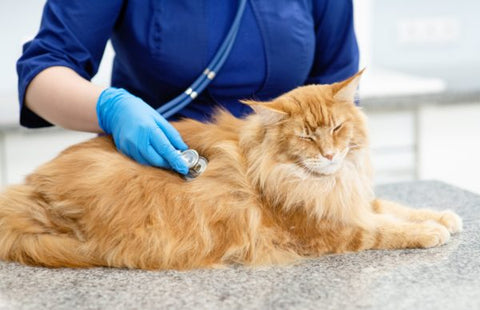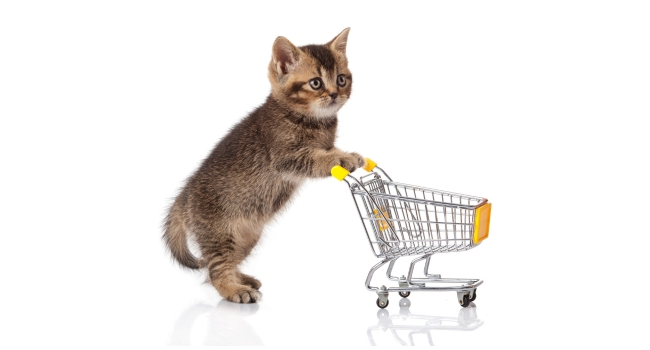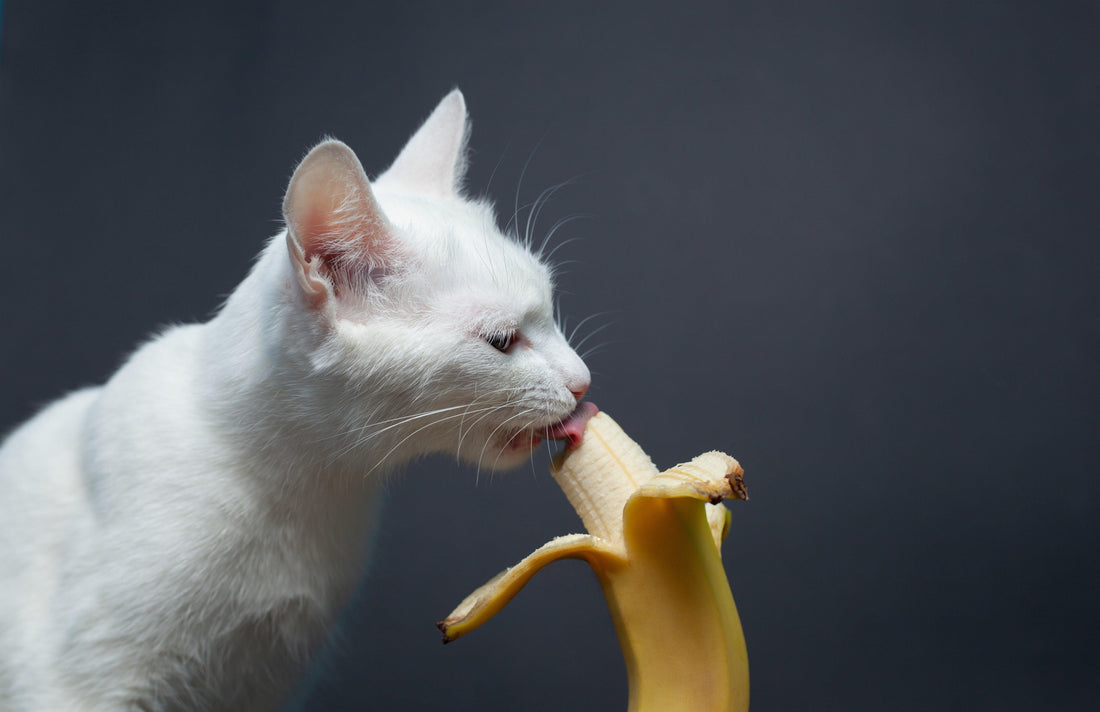Can cats eat bananas? If you own an inquisitive feline, you might be wondering what they can and cannot eat.
The question of whether or not cats can eat bananas has been debated quite a bit, but there's only one way to settle the matter – by looking at the facts!
While some people claim that it’s perfectly fine for cats to eat bananas, others have warned against this practice because they believe it will cause serious harm to your feline companion.
So what’s the truth? Is it possible to give your cat a banana? Find out if your feline friend can safely enjoy bananas in this article.
Can Cats Eat Bananas?

It's a common misconception that cats can't eat bananas. The truth is, cats eat bananas, but it's not the healthiest option for your cat since it is high in carbohydrates.
High-carbohydrate foods can sometimes be problematic for cats in certain ways.
They might enjoy it once in a while and some cats love them. However, there are much healthier options that you should consider when serving your cat food such as chicken, beef or fish - these meats are way better for your cat and will ensure they get the nutrition they need to survive.
Feeding your feline friend bananas is fine. Although bananas are not poisonous to cats, they can cause some health problems. Therefore, you should take a moment to consider the pros and cons before giving bananas to your cat
What are the Risks of Feeding Bananas to Cats?
The disadvantages of a high-carb diet like banana for a cat:
- Gastrointestinal Issues
- Allergic Reaction
- Risk of diabetes
- Possibility of obesity
1. Gastrointestinal Issues
Bananas are carbohydrate-rich fruit that may cause digestive problems for cats. Since cats have sensitive digestive systems, bananas may not be a good idea for them.
One of the most common problems associated with bananas and other high-carb fruits is diarrhea.
This can lead to dehydration and potentially cause dangerous levels of electrolyte imbalance in your pet.
Other symptoms may include:
- Vomiting
- Abdominal pain
- Poor appetite
If a cat’s digestive system continues to worsen, it could lead to severe weight loss. Take your pet to a veterinarian if any of these signs show up.
When you take your cat to the vet, mention that you've given him/her a banana or anything containing a banana recently.
2. Allergic Reaction
Your cat may get an allergic reaction after eating a banana. If you're worried about your cat's health, it's important to take notice of changes in your cat's health.
The most common symptom of an allergic reaction includes:
- Difficulty in swallowing
- Itching of the skin
- Labor Breathing
- Red pustules on the skin
- Swollen mucous membranes
- Nasal or ocular discharge
It's important to get this type of food allergy diagnosed as soon as possible because it can be life-threatening if left untreated.
3. Risk of Diabetes
Cats have a delicate pancreas that produces insulin to keep their blood glucose level in check. If you overfeed your cat with carbs, its pancreas can fail over time.
4. Possibility of Obesity
Bananas are high in carbs and can contribute to weight gain in cats. Obesity is a life-threatening condition that can cause diabetes, heart disease, and joint problems.
In some cases, it can even lead to death. That's why if your cat seems overweight, you should cut back on its carbs intake or switch to another diet altogether.
If your cat continuously consumes large amounts of sugar, it will develop diabetes.
What to Do If Your Cats Show Signs of Discomfort?

Bananas are a healthy snack for humans but not for the cat. They can cause stomach upset if your cat eats too many.
If you think your cat has eaten a banana, monitor them closely for signs of discomfort. Take your cat to the vet as soon as possible if he/she shows any symptoms after eating bananas.
Can Kittens Eat Bananas?
Bananas should not be given to kittens for the first 12 months. It is important to feed kittens a diet that contains high levels of protein, calcium, magnesium, and other essential nutrients.
But after 12 months, you can start giving them some as a treat. You'll just need to see what their body tells you in terms of digestion and appetite.
Are Cats Scared of Bananas?
Cats do not like bananas because the banana peel emits ethyl acetate, which they dislike. The banana also has a strong odor that is likely to bother a cat's sensitive nose.
However, it is still possible for a cat to eat a banana if she wants to and if you are careful when peeling the fruit.
How Much Banana Can You Safely Give to Your Cat?
As with any new food, you should introduce your cat to it in small, bite-sized portions as an occasional treat. If you're thinking of feeding your kitty a banana, here's how to do it safely.
- Cut the banana into bite-sized pieces
- Only serve a small slice per week
- Make sure you pay attention to the quantity
- Observe your cat's health after introducing banana
Are there Nutritional Benefits to Feeding Cats Bananas?

he banana is not a nutritionally beneficial food for cats, and it contains a considerable amount of sugar, which cats cannot tolerate.
Giving a cat the right diet can be a breeze - it's just a matter of knowing what he or she needs. The key ingredients for a healthy diet for a cat are protein, water, fat, carbohydrates, and minerals. These are all important for a cat to have in order to live a healthy life.
The easiest way to feed a cat properly is to provide him or her with complete and balanced food.
There are several other options for protein-rich snacks:
- Chicken
- Lean beef
- Shrimps and prawns
- Sardines
- Lamb
- Cooked eggs
- Salmon
- Mackerel
- Tuna
Feeding bananas to your cat is not necessary, as bananas do not provide nutrients and can cause health problems like diarrhea.
Fruits that are Harmful to Cats
Cats may be able to tolerate bananas in moderation, but other fruits can be harmful to them. There are several fruits that can cause gastrointestinal problems in cats and should not be given to them. These include:
- Cherries
- Grapes
- Limes
- Raisins
- Persimmons
- Lemons
Fruits for Cats that Can be Eaten Occasionally
It is okay for cats to eat the following fruits in moderation, but they should not consume too many of them. Unfortunately, these fruits do not provide healthy nutrients to cats.
- Apples
- Apricots
- Blueberries
- Cranberries
- Mango
- Cantaloupe
- Strawberries
- Pineapples
- Raspberries
- Pears
Just remember that any type of fruit is typically high in sugar and may not be good for your kitty because it may lead to weight gain or diabetes.
Key Takeaways
- Bananas are not poisonous to cats, but they are high in carbs, which can cause serious health problems.
- A small slice of banana will likely be fine as a once-in-a-while treat for your pet.
- Bananas can cause gastrointestinal issues, diabetes, and obesity if consumed in excess.
- Give your cat a balanced diet instead of bananas because bananas are not nutritionally beneficial for them.
- Always speak to your vet before giving your cat anything new.
Importance of Pet Insurance
Pet insurance is a great way to protect your animal's health. It can be hard to predict when an accident will happen, but with pet insurance, you're covered.
There are a few different types of plans depending on your needs, and it only takes minutes to get coverage for your pet.
Some pet insurance companies will even cover 100% of veterinary expenses. So make sure to choose the best pet insurance plan for your furry friend.
Once you have a plan in place, vet bills will never be too high because they'll already be covered by the policy.
It's important that we all take care of our animals' safety and well-being so they can enjoy their lives just as much as we do ours.
What Makes Genius Litter Different from Ordinary Litter?

Say goodbye to hauling heavy bags and hello to easy Genius Litter.
With our innovative non-clumping litter formula, you'll need less of it. One bag of our disposable Genius Litter lasts up to a month, so you won't need to refill the box as often and can save money on monthly costs.
One thing that separates us from traditional litter is that Genius Litter changes color to indicate when your cat has a potential health issue, so you can get them help before it becomes an urgent medical situation.
All you need to do is set up a delivery date with us each month, and rest easy knowing that Genius Litter will arrive at your doorstep every 30 days.
For a convenient solution for your cat, try Genius Litter today!
Why is Lysine So Important for Your Pet?

Protect your pet's immunity!
Have you noticed that your cat is coughing, sneezing, and having rapid breathing? Or maybe he/she has been scratching more than usual?
These are all signs of a weakened immune system. One way to prevent this from happening is by using lysine supplements.
Lysine plays a key role in your pet's immunity because it helps to regulate the immune system.
Without enough lysine, your pets will be more susceptible to illness because their immune system can't fight off infections as efficiently.
When they are sick, they will also be less able to absorb nutrients and make use of other supplements that can help them feel better.
Give your pet the support they need. Our Lysine supplement provides essential amino acids to help support a strong immune system.
Order now to get 300 one-scoop servings or 150 two-scoop servings and don't worry about expiry!





